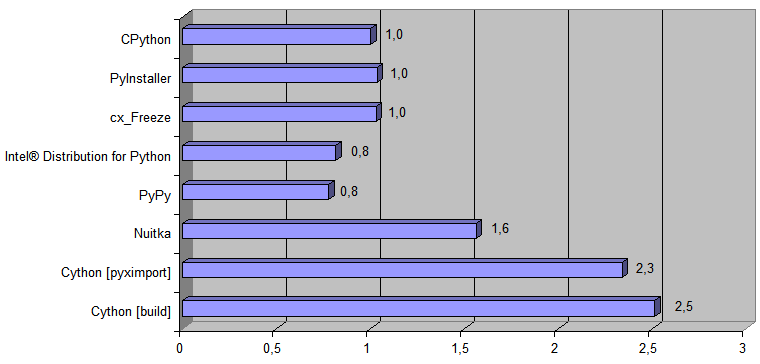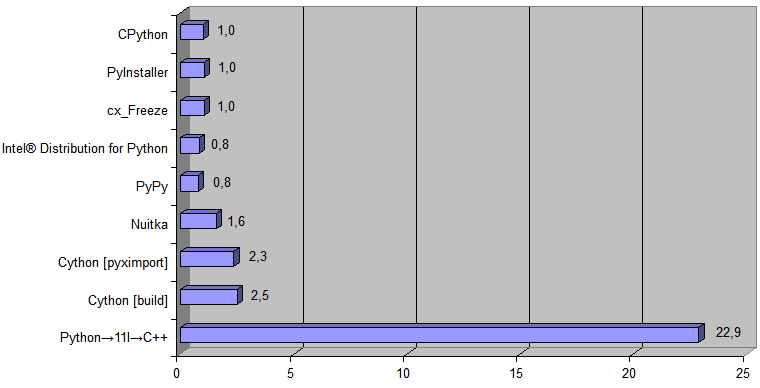Python transpiler chain → 11l → C ++ [to speed up Python code and more]





This article discusses the most interesting transformations that the chain of two transpilers (the first translates the Python code into the code in the new 11l programming language , and the second - the 11l code in C ++), and compares the performance with other acceleration tools / code execution in Python (PyPy, Cython, Nuitka).
Replacing "slices" \ slices on ranges \ ranges
| Python | 11l |
| |
s[(len)-2] instead of just s[-2] needed to eliminate the following errors:- When it is required, for example, to get the previous character by
s[i-1], but with i = 0 such / this record instead of an error will silently return the last character of the string [ and I encountered this error in practice - commit ] . - The expression
s[i:]afteri = s.find(":")will work incorrectly when the character is not found in the string [ instead of the "part of the string starting from the first character:and then" the last character of the string will be taken ] (and , to return-1with thefind()function in Python, I also consider incorrectly [ should return null / None [ and if -1 is required, then it should be written explicitly:i = s.find(":") ?? -1] ] ). - Writing
s[-n:]to get the lastncharacters of the string will work incorrectly with n = 0.
Chains of comparison operators
At first glance, it’s an outstanding feature of the Python language, but in practice it can be easily abandoned / dispensed with using the
in operator and ranges:a < b < c | b in a<..<c |
a <= b < c | b in a..<c |
a < b <= c | b in a<..c |
0 <= b <= 9 | b in 0..9 |
List inclusion (list comprehension)
Similarly, as it turned out, you can opt out of another interesting Python feature - list comprehensions.
While some glorify list comprehension and even suggest discarding `filter ()` and `map ()` , I found that:
- In all places where I met Python's list comprehension, you can easily get away with the functions `filter ()` and `map ()`.
dirs[:] = [d for d in dirs if d[0] != '.' and d != exclude_dir] dirs[:] = filter(lambda d: d[0] != '.' and d != exclude_dir, dirs) '[' + ', '.join(python_types_to_11l[ty] for ty in self.type_args) + ']' '[' + ', '.join(map(lambda ty: python_types_to_11l[ty], self.type_args)) + ']' # Nested list comprehension: matrix = [ [1, 2, 3, 4], [5, 6, 7, 8], [9, 10, 11, 12], ] [[row[i] for row in matrix] for i in range(4)] list(map(lambda i: list(map(lambda row: row[i], matrix)), range(4))) - `filter ()` and `map ()` in 11l look prettier than in Pythonand therefore the need for list comprehensions in 11l actually disappears [the replacement of list comprehension with
dirs[:] = filter(lambda d: d[0] != '.' and d != exclude_dir, dirs) dirs = dirs.filter(d -> d[0] != '.' & d != @exclude_dir) '[' + ', '.join(map(lambda ty: python_types_to_11l[ty], self.type_args)) + ']' '['(.type_args.map(ty -> :python_types_to_11l[ty]).join(', '))']' outfile.write("\n".join(x[1] for x in fileslist if x[0])) outfile.write("\n".join(map(lambda x: x[1], filter(lambda x: x[0], fileslist)))) outfile.write(fileslist.filter(x -> x[0]).map(x -> x[1]).join("\n"))filter()and / ormap()is performed during the conversion of the Python code to 11l automatically ] .
Convert the if-elif-else chain to switch
While Python does not contain a switch statement, this is one of the most beautiful constructs in 11l, and so I decided to insert the switch automatically:
| Python | 11l |
| |
For completeness, here is the generated C ++ code.
switch (instr[i]) { case u'[': nesting_level++; break; case u']': if (--nesting_level == 0) goto break_; break; case u''': ending_tags.append(u"'"_S); break; // '' case u''': assert(ending_tags.pop() == u'''); break; } Converting small dictionaries to native code
Consider this line of Python code:
tag = {'*':'b', '_':'u', '-':'s', '~':'i'}[prev_char()] Most likely, this form of recording is not very effective [ in terms of performance ] , but very convenient.')
In 11l, the entry corresponding to this line [ and obtained by the Python transpiler → 11l ] is not only convenient [ however, not as elegant as in Python ] , but also fast:
var tag = switch prev_char() {'*' {'b'}; '_' {'u'}; '-' {'s'}; '~' {'i'}} The line above is shipped to:
auto tag = [&](const auto &a){return a == u'*' ? u'b'_C : a == u'_' ? u'u'_C : a == u'-' ? u's'_C : a == u'~' ? u'i'_C : throw KeyError(a);}(prev_char()); [ Calling the lambda function, the C ++ compiler will embed \ inline during the optimization process and only the chain of ?/: Operators will remain. ]In the case when assignment is made to a variable, the dictionary is left as is:
| Python | |
| 11l | |
| C ++ | |
Capture \ Ca pture external variables
In Python, to indicate that a variable is not local, but must be taken outside [ from the current function ] , the nonlocal keyword is used [ otherwise, for example,
found = True will be interpreted as creating a new local variable found , rather than assigning a value existing external variable ] .In 11l, the prefix @ is used for this:
| Python | 11l |
| |
auto writepos = 0; auto write_to_pos = [..., &outfile, &writepos](const auto &pos, const auto &npos) { outfile.write(...); writepos = npos; }; Global variables
Similar to external variables, if you forget to declare a global variable in Python [ via the global keyword ] , you get an inconspicuous bug:
| |
break_label_index error at the compilation stage with the 'undeclared variable break_label_index '.Index / number of the current container item
I always forget the order of the variables that the Python function returns
enumerate {first comes the value and then the index or vice versa}. Ruby's analog behavior - each.with_index - is much easier to remember: with index means that index comes after value, not before. But in 11l, the logic is even easier to memorize:| Python | 11l |
| |
Performance
As a test, the program uses the conversion of PC markup to HTML , and the source data is taken from the source code of the article on PC markup [ since this article is currently the largest written on PC markup ] , and is repeated 10 times, i.e. It turns out from 48.8 kilobyte article a file of 488Kb
Here is a diagram showing how many times the corresponding method of executing Python code is faster than the original [ CPython ] implementation:

And now let's add to the diagram the implementation generated by the Python transpiler → 11l → C ++:
Execution time [ 488Kb file conversion time ] was 868 ms for CPython and 38 ms for generated C ++ code [ this time includes full-featured [ i.e. not just working with data in RAM ] launching the program by the operating system and all the input / output [ reading the original file [ .pq ] and saving the new file [ .html ] to the disk ] ] .
I also wanted to try Shed Skin , but it does not support local functions.
Numba also failed to use (gives the error 'Use of unknown opcode LOAD_BUILD_CLASS').
Here is the archive with the program used for performance comparison [ for Windows ] (installed Python 3.6 or higher and the following Python packages are required: pywin32, cython).

Execution time [ 488Kb file conversion time ] was 868 ms for CPython and 38 ms for generated C ++ code [ this time includes full-featured [ i.e. not just working with data in RAM ] launching the program by the operating system and all the input / output [ reading the original file [ .pq ] and saving the new file [ .html ] to the disk ] ] .
I also wanted to try Shed Skin , but it does not support local functions.
Numba also failed to use (gives the error 'Use of unknown opcode LOAD_BUILD_CLASS').
Here is the archive with the program used for performance comparison [ for Windows ] (installed Python 3.6 or higher and the following Python packages are required: pywin32, cython).
Python source and output of Python → 11l and 11l → C ++ transpilers:
| Python | 11l generated (with keywords instead of letters) | 11l (with letters) | C ++ generated |
Source: https://habr.com/ru/post/431318/
All Articles